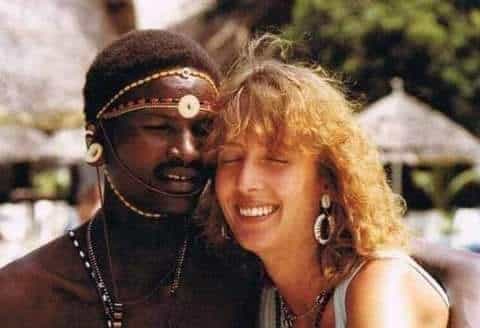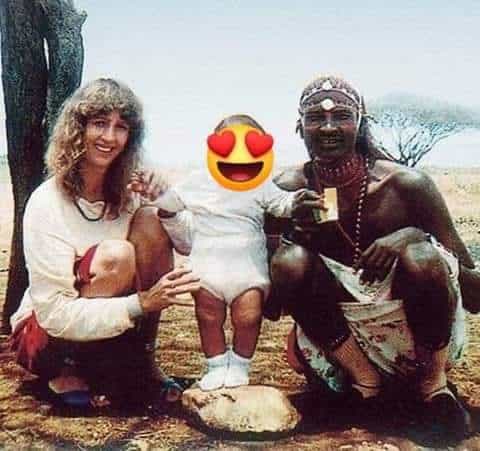The story of Corinne Hofmann, the Swiss woman who fell in love with a Kenyan warrior

She was preparing to marry a carpenter when, on vacation in Kenya, she fell in love with a warrior seen by the side of the road. She leaves everything, shares the life of her tribe. They have a child, she runs away. Today, near Zurich, she manages the success of her apparently unvarnished biography.
The book has currently only been released in German and yet it is sold by entire stacks in bookstores in French-speaking Switzerland. Die weisse Massai, the white Massai, is an international bestseller six months after its publication, written in the Zurich Oberland. 150,000 copies have already been sold, a Danish edition is in progress, projects in French and English are aimed at the vast American and French-speaking markets. Because Corinne Hofmann, heroine and writer of her adventures in Africa, is not only a woman determined to follow through with her feelings, she is also an excellent saleswoman.
Initially, this young German raised in Thurgau successfully sold second-hand designer clothes in Bienne. She is about to open a second store in Bern and get married to a nice carpenter when a vacation in Kenya changes everything in her life. She sees a splendid Maasai warrior at the side of the road and her being immediately reaches out to him: it’s him, the man of her life! A few well-negotiated coincidences later, Corinne leaves her life in Switzerland and leaves to join Lketinga on the Kenyan coast. He’s not here anymore! So does he want it? No matter, Corinne has made up her mind. Her book tells in a thousand thrilling details how, for months, the 27-year-old young woman will do everything possible to join her “Darling” in her Maasai village, then to be accepted by her family, her ethnic group.
She will live there, in a hut of mud and dried dung, drinking water from the river, for about two years. She will not hesitate to bond with this man who is very far from her culture: a Maasai warrior must have several wives, he does not necessarily share the food or the daily life of his wife but it is he who decides on his freedom of movement. “Before, I was the strong element in my relationships. There, I let everything go.”
Corinne Hofmann will marry Lketinga, they will even have a child, a daughter who is now 9 years old: Napirai, “the Well Trained”. With her last savings, the young woman opens a grocery store in their Maasai village which lacks everything. It was immediate success, quickly undermined, however, by Lketinga’s constant suspicion, by his jealousy fueled by his wife’s obvious skills.
At the end of the book, photos show Corinne blonde and happy, astonishing in a white wedding dress with the Maasai women. On others, a emaciated Corinne: undernourished, suffering from malaria then hepatitis, undermined by arguments, she gradually loses her incredible energy. She convinces her husband to return to the coast, to Mombasa, where she opens, once again successfully, a Maasai souvenir store. Their amazing couple attracts tourists. But as her husband’s jealousy remains violently obsessive, she decides to flee to Switzerland with their daughter. It was 1990, three and a half years after the first meeting. Lketinga never saw Corinne or Napirai again, who no longer ventured into Kenya for fear of not being able to leave.
Five years later, in 1995, Corinne began to write her flowing story, handwritten, chronologically. Three hundred well-produced pages, full of striking details, tell the love story, the thousand chaotic, exhausting journeys in the forest, the brush with death on several occasions, the relationships formed, the moments of happiness, the moments of horror . Fear is rarely present, Corinne Hofmann immediately felt at ease, “at home”, in this land, in this ethnic group, despite the total discomfort and the difficulties in communicating. His asset: impressive mental and physical energy.
The story as told by the heroine can only please, it has all the ingredients of popular success. She apparently reveals almost everything about Corinne’s African years, down to the last letters she wrote to her husband and her in-laws. “The book reads like a newspaper!” exclaim the many readers who write to him, admiring his courage, his ability to adapt to African reality, and above all his ability to love so strongly. Some offer to help here and there.
Here it is not necessary. Corinne and Napirai today live materially well in Bäretswil, in the Zurich Oberland. Corinne, now brunette, fulfilled, sophisticated, apparently earns a good living representing dental products. She is already hesitant to work less to better manage her success. Television talk shows, public readings, interviews, photo sessions, mother and daughter are now used to it, requests are pouring in from everywhere. Napirai lets it happen; She seems to live better with her first name, her curly hair and her brown skin since her friends admire her notoriety.
Corinne remains in contact with Lketinga’s family who remarried and has another little girl, she supports her financially. She is thinking of setting up a long-term project to help the Maasai village, but “you have to think carefully, plan the structures”, and managing its success is taking up her time. She of course expresses her nostalgia for Africa, for wild animals, for the strong moments experienced.

But the woman who speaks easily to journalists in Bäretswil does not dwell on the traces left by this significant experience. No ethnological analyses, no moral or emotional considerations either on her choices, on her departure from Africa and those she left behind. The book was translated into Maasai for Lketinga and his relatives, what they thought of it, we don’t really know.
Corinne Hofmann says she is above all instinctive, a go-getter. She is looking forward to her next “task”, the one that the book will perhaps bring to light. And she will throw herself into it again with all her heart and soul.
FAQ: Corinne Hofmann and The White Masai
1. What happened to Corinne Hofmann?
Corinne Hofmann is a Swiss author who became widely known for her memoir The White Masai. The book recounts her life-changing experience of falling in love with a Samburu warrior, Lketinga, while on vacation in Kenya, marrying him, and adapting to a life vastly different from her European roots. However, cultural differences, language barriers, and lifestyle challenges led to the eventual breakdown of their marriage. After four years in Kenya, Corinne returned to Switzerland with her daughter. She has since written sequels documenting her life after leaving Kenya and revisiting the Samburu people.
2. Is The White Masai based on a true story?
Yes, The White Masai is based on a true story. The book is Corinne Hofmann’s autobiographical account of her relationship with Lketinga, a Samburu warrior, and her experiences living in Kenya. It provides a raw and honest depiction of her struggles and joys in navigating an intercultural marriage and life in a remote Samburu village.
3. What movie does the white woman marry a Masai?
The movie The White Masai (Die weiße Massai in German) is based on Corinne Hofmann’s memoir. It portrays the story of a European woman who falls in love with a Masai warrior and moves to Kenya to marry him. Released in 2005, the film highlights the cultural contrasts and challenges of their relationship.
4. Did the Masai practice polygamy?
Yes, the Maasai, including the Samburu people, traditionally practice polygamy. In their culture, having multiple wives is common and often seen as a sign of wealth and social status. This practice reflects their pastoral lifestyle, where larger families can share the responsibilities of herding and domestic chores. Polygamy, however, can create challenges in relationships with individuals from cultures where monogamy is the norm, as seen in Corinne Hofmann’s story.
